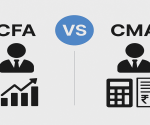A Chartered Financial Analyst (CFA) is a globally recognized professional in finance and investment. Many commerce students and working professionals ask how to become a CFA in India. To become a certified CFA, one must clear all three CFA exam levels, meet the CFA eligibility criteria, and register with the CFA Institute. This prestigious designation opens the door to a wide range of finance careers and higher salaries in India and abroad.
How to Become a CFA?
Many students and professionals wonder about the proper path to becoming a CFA. The process includes a series of straightforward steps, from meeting the basic educational qualifications to passing the final level of the CFA exam.
We begin the registration processes for CFA, which are all conducted online through the registration portal of the CFA Institute. A candidate must create an account on the official CFA Institute website. They need a recognized passport and international payment before they can fully register. The next step entails exam-level selection. Each candidate must start with CFA Level 1. Upon successful registration, candidates are given access to study materials and the CFA exam schedule. During registration, they must also choose an exam center where they will sit for the exams.
Step 1: Understand the CFA Eligibility Criteria
Before starting registration, candidates must know the CFA eligibility criteria. A candidate could take the CFA Level 1 if they fulfill one of the following requirements. They are either
- The final year of a bachelor’s degree program.
- Has received a bachelor’s degree.
- A combination of work experience totaling at least 4 years (open to any field).
- A mixture of college/university and work experience, summing to 4 years.
Not meeting these criteria will not take the candidates through the CFA registration process. To be eligible for the exam, each candidate must possess a valid international passport.
Step 2: Register on CFA Institute Website
Upon confirming eligibility, candidates must proceed with their CFA registration process on the official CFA Institute registration portal. Parts of the registration involve creating an online profile, submitting identity proof (passport), and signing the CFA Program Candidate Agreement, which encloses ethical behavior, professionalism, and exam integrity. The portal is user-friendly and provides access to all required resources when the account is set up. Here, candidates choose the test center location and the exam window. The CFA Institute gives many exam dates throughout the year for each level. Hence, candidates may choose the most suitable time.
Step 3: Pay the CFA Certification Cost
Until payment is made, the registration remains invalid. Every candidate must pay a one-time and nonrefundable enrollment fee of $350 during first-time registration. Each exam level bears its own charges for all the other registration expenses. The fee structure is dual:
- Early Registration Fee: Rs. 78,000 approx. (highly recommended)
- Standard Registration Fee: Rs. 1,03,000 approx
This CFA cost will also get you the official CFA learning ecosystem featuring a digital curriculum and practice questions; optional hard-copy curriculum books are available at an extra charge. In addition, candidates should budget for expenses like third-party materials or mock examinations as required.
Step 4: Choose the Exam Window and Center
While registering, candidates must choose a CFA exam schedule by selecting the exam window. The CFA Institute has given multiple exam windows within each level throughout the year. Level 1 is offered four times a year, Level 2 three times, and Level 3 two times. After the exam window is chosen, the candidate selects the nearest Prometric testing center; the location options are shown during registration. The sooner one registers, the better the chances of securing the preferred center and time slot. Rescheduling is allowed with an extra cost.
Step 5: Study for CFA as Per the Study Plan
Once registered, candidates must start preparation as per a CFA-structured study plan. The CFA Institute recommends at least 300 hours of study for each level. The study material is provided through their learning portal, reading modules, practice questions, and mock exams. Candidates must focus their study strategy according to the topic weightage. Topics such as ethics, Financial Reporting, equity, and fixed income have significant weightage in Level 1. Creating a timetable and achieving weekly goals would be helpful amidst the vast syllabus. Many candidates refer to third-party materials for additional video lectures and summaries.
Step 6: Pass Level 1, Level 2, and Level 3
For a candidate to become a CFA charterholder, they must pass all three levels of the CFA examinations. Each level tests a different set of skills:
- Level 1 tests on investment tools, fundamental understanding, and comprehension.
- Level 2 tests on valuation of assets, application, and case-based assessments.
- Level 3 tests on portfolio management, wealth planning, and essay writing.
Each level is more difficult than the previous. The CFA exam becomes increasingly complex at each level. The pass rate of CFA varies from time to time and remains below 50% most of the time, especially in Level 1. An incessant practice of mock tests and revision is the key to passing.
Step 7: Submit Professional Work Experience
After passing all three levels, candidates must prove at least 4,000 hours of work experience in investment-related roles over 36 months. This experience may precede, accompany, or succeed the examinations. Qualifying roles encompass financial analysis, portfolio management, risk analysis, investment banking, and trading. The work needs to involve decisions based on economic knowledge. The CFA Institute assesses this experience as part of the charter application process.
Step 8: Get Chartered by the CFA Institute
The final step is to apply for the CFA charter. Candidates must:
- Submit proof of work experience.
- Provide professional references (usually two or three).
- Agree to follow the CFA Institute’s Code of Ethics and Standards of Professional Conduct.
The CFA designation is awarded once the CFA Institute reviews and approves the application. The candidate becomes a CFA charterholder and can use the CFA letters after their name. This marks the official completion of the journey.
CFA Course Duration
CFA is a long-term commitment. Understanding the CFA course duration, CFA exam fees, and CFA syllabus helps candidates plan better.
CFA Course Duration and Timeline
Depending on individual speed, the CFA course duration typically spans 2 to 4 years. Most candidates take 6 to 12 months of preparation for each level. Since there are three levels, a fast-tracked candidate might finish in 2 years, while others take longer due to work or study balance.
CFA Course Details and Fee Structure
Note: These fees can change slightly each year. Candidates should check the latest details on the CFA Institute website. The cost of CFA certification becomes significant when you include study material and other tools. Candidates should plan for at least INR 2-3 lakhs for the full course.
| Fee Type | Amount (USD) | Amount (INR) |
| Enrollment Fee | $350 (one-time) | ₹29,050 |
| Early Registration | $940 per level | ₹78,020 per level |
| Standard Registration | $1,250 per level | ₹103,750 per level |
Career Opportunities and Salary After CFA
Completing the CFA opens up global CFA career opportunities. Many sectors welcome CFA charterholders, including investment banking, asset management, and equity research.
Top CFA Job Roles in India
After earning the CFA charter, professionals can apply for roles such as:
- Investment Analyst
- Equity Research Analyst
- Portfolio Manager
- Risk Analyst
- Financial Advisor
- Fund Manager
These CFA job roles are available in both Indian and international companies. Firms like JPMorgan, Morgan Stanley, Deloitte, and EY hire CFAs in India.
CFA Salary in India: A Clear Overview
The CFA salary in India depends on experience, city, and job role. Freshers with Level 1 can earn ₹4–6 LPA. After completing all three levels and gaining some experience, the salary goes up to ₹10–15 LPA or more.
| Experience | Average Salary (INR/month) |
| CFA Level 1 | ₹30,000 – ₹50,000 |
| CFA Level 2 | ₹50,000–₹75,000 |
| CFA Level 3 | ₹75,000–₹120,000 |
| CFA Charterholder | ₹150,000+ |
The actual CFA salary in India may vary based on company and location. Tier-1 cities like Mumbai and Bangalore offer higher pay.
CFA Level-Wise Exam Pattern and Preparation Strategy
The CFA exam is divided into three levels. Understanding the CFA exam levels and building the right CFA study plan is key to success.
CFA Level-Wise Exam Pattern
- Level 1: Focuses on knowledge and understanding of basic concepts.
- Level 2: Tests the application of investment tools.
- Level 3: Focuses on portfolio management and wealth planning.
Each exam is computer-based and consists of multiple-choice and case-study questions.
| CFA Exam Level | Exam Type | Duration | Number of Questions |
| Level 1 | MCQs | 4.5 hrs | 180 |
| Level 2 | Item sets | 4.5 hrs | 88 |
| Level 3 | Case study + Essay | 4.5 hrs | Varies |
CFA Exam Preparation Tips and Strategy
- Follow the official CFA study plan for each level.
- Spend at least 300 hours of study per level.
- Solve mocks and practice papers.
- Focus more on weak subjects from mock results.
- Use a mix of official books and third-party prep tools
- The CFA exam difficulty increases at each level. Many candidates fail due to poor time management. Therefore, a smart strategy and regular revision are necessary.
How to Become a CFA FAQs
1. What are the CFA exam requirements for Indian students?
Indian students need a passport, a graduation (or be in the final year), and must register with the CFA Institute. English proficiency is necessary.
2. How long is the CFA course duration?
The CFA course duration ranges from 2 to 4 years, depending on the candidate’s speed and preparation.
3. What is the CFA certification cost in India?
The total CFA certification cost is between ₹2.5 and ₹4 lakhs, including all three levels and the enrollment fee.
4. What are the typical CFA job roles in India?
CFA job roles include equity analyst, portfolio manager, investment banker, and financial advisor.
5. What are the CFA Level 1 topics?
CFA Level 1 topics include ethics, quantitative methods, economics, financial reporting, corporate finance, equity, fixed income, derivatives, alternative investments, and portfolio management.


